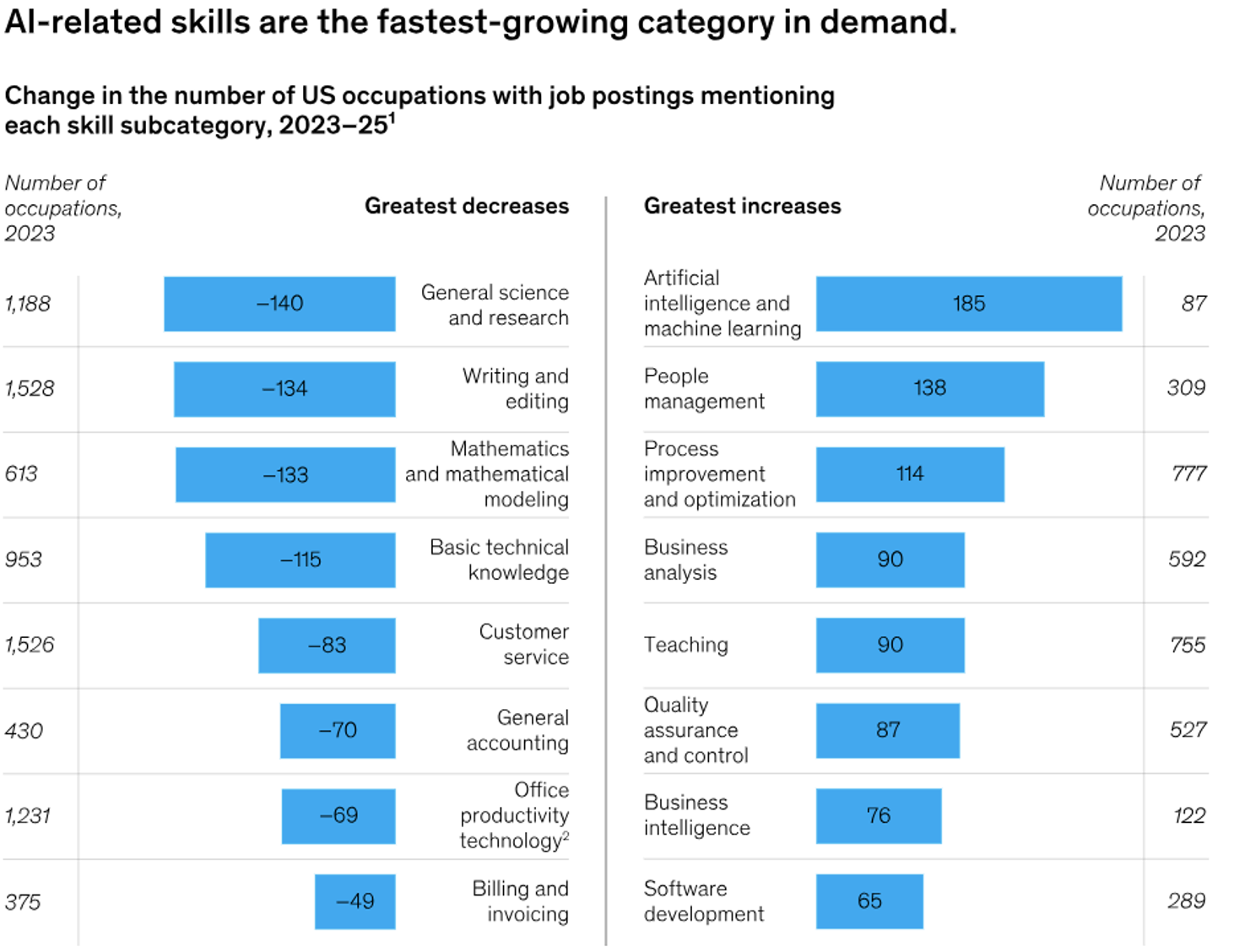AI Update: The 7X AI Fluency Surge - Our Wake-Up Call
KMI Instructor and AI Expert, Rooven Pakkiri
ai-update-the-7x-ai-fluency-surge---our-wake-up-call
December 7, 2025
The Intersection of Process Mining and Knowledge Management
the-intersection-of-process-mining-and-knowledge-management
November 14, 2025
The KM Leader's Guide to Fostering a Culture of Contribution
Devin Partida
the-km-leaders-guide-to-fostering-a-culture-of-contribution
November 12, 2025
How to Improve Team Collaboration with Enterprise Content Management Software
Lucy Manole
how-to-improve-team-collaboration-with-enterprise-content-management-software
October 15, 2025
AI Use Case #2 – How AI Can Transform Metadata and Search Consistency in Presales Knowledge Libraries
Ekta Sachania
ai-use-case-2---how-ai-can-transform-metadata-and-search-consistency-in-presales-knowledge-libraries
October 14, 2025
AI Use Case #1: Turning Bid Review Meetings into Smart Knowledge Assets – The Missed Opportunity in Every Bid Review
Ekta Sachania
ai-use-case-1-turning-bid-review-meetings-into-smart-knowledge-assets---the-missed-opportunity-in-every-bid-review
October 8, 2025
Onboarding & Offboarding: A Continuous KM Lifecycle
Top KMI Guest Blogger Ekta Sachania
onboarding-offboarding-a-continuous-km-lifecycle
October 2, 2025
How to Write Clear and Concise Knowledge Base Articles for Better Customer Support
Lucy Manole
how-to-write-clear-and-concise-knowledge-base-articles-for-better-customer-support
September 18, 2025
The New Information Governance: Integrating Personal Security into Corporate KM Policy
Devin Partida
the-new-information-governance-integrating-personal-security-into-corporate-km-policy
September 17, 2025
The Life Cycle of Compliance: A KM Perspective on Managing Regulatory Knowledge
Devin Partida
the-life-cycle-of-compliance-a-km-perspective-on-managing-regulatory-knowledge
September 12, 2025
Redesigning the KM Ecosystems: Insight, Connection, and Collaboration Supported by AI
Ekta Sachania
redesigning-the-km-ecosystems-insight-connection-and-collaboration-supported-by-ai
September 8, 2025
When AI Meets Knowledge Management: The Next Leap in Healthcare
Ekta Sachania
when-ai-meets-knowledge-management-the-next-leap-in-healthcare-2
September 2, 2025
Top 7 OKR Tools That Boost Knowledge Capture & Transfer
Lucy Manole
top-7-okr-tools-that-boost-knowledge-capture-transfer
August 28, 2025
Automating Information Life Cycle Management — Minimizing Risk in 2025
Devin Partida
automating-information-life-cycle-management----minimizing-risk-in-2025
August 25, 2025
Aligning Your Knowledge Strategy With Your Business Strategy for Maximum Impact
Devin Partida
aligning-your-knowledge-strategy-with-your-business-strategy-for-maximum-impact
August 22, 2025
The Life-Saving Power of Knowledge Management in Healthcare
Ekta Sachania
the-life-saving-power-of-knowledge-management-in-healthcare-2
August 11, 2025
How To Safeguard Critical Knowledge Assets Before, During, and After a Crisis
Amanda Winstead
how-to-safeguard-critical-knowledge-assets-before-during-and-after-a-crisis
July 30, 2025
Knowledge Mapping: From Framework to Real Impact
Ekta Sachania
knowledge-mapping-from-framework-to-real-impact
July 19, 2025
Cultural Dimensions of Knowledge Exchange: Building Inclusive Participation Models
Devin Partida
cultural-dimensions-of-knowledge-exchange-building-inclusive-participation-models
July 15, 2025
The Role of Knowledge Stewards in Safeguarding Organizational Intelligence
Devin Partida
the-role-of-knowledge-stewards-in-safeguarding-organizational-intelligence
July 14, 2025
Creating Effective Communities of Practice Across Global EOR-Employed Specialists
Devin Partida
creating-effective-communities-of-practice-across-global-eor-employed-specialists
July 11, 2025
When Systems Fail: What a Crisis Teaches Us About Knowledge Management
Top KMI Blogger Ekta Sachania
when-systems-fail-what-a-crisis-teaches-us-about-knowledge-management
July 5, 2025
Beyond Metrics: The Hidden ROI of Knowledge Management
Ekta Sachania
beyond-metrics-the-hidden-roi-of-knowledge-management
July 1, 2025
The Impact of Agentic AI on Personal Knowledge Retention
Devin Partida
the-impact-of-agentic-ai-on-personal-knowledge-retention
June 13, 2025
AI as the Antidote: How Artificial Intelligence Can Heal Social Media's Wounds
Rooven Pakkiri
ai-as-the-antidote-how-artificial-intelligence-can-heal-social-medias-wounds
June 12, 2025
Measuring the ROI of Communities of Practice in Knowledge-Intensive Organizations
Devin Partida
measuring-the-roi-of-communities-of-practice-in-knowledge-intensive-organizations
June 11, 2025
Why is AI and Knowledge Management so Symbiotic?
Rooven Pakkiri
the-au
June 8, 2025
Five Take-Aways from the Certified AI Manager Program - Why This Course Changes Everything
Rooven Pakkiri
five-take-aways-from-the-certified-ai-manager-program---why-this-course-changes-everything
May 27, 2025
The Role of Knowledge Management in Streamlining Compliance Processes
Devin Partida
the-role-of-knowledge-management-in-streamlining-compliance-processes
May 19, 2025
How Effective Knowledge Management Can Enhance Nonprofit Impact
Devin Partida
how-effective-knowledge-management-can-enhance-nonprofit-impact
May 16, 2025
Best Practices for Financial Knowledge Management Within Organizations
Devin Partida
best-practices-for-financial-knowledge-management-within-organizations
May 15, 2025
The Evolving Role of a Knowledge Manager in the Age of AI: Collaboration, Not Redundancy
Ekta Sachania
the-evolving-role-of-a-knowledge-manager-in-the-age-of-ai-collaboration-not-redundancy
May 14, 2025
Why Knowledge Management is Critical for Bid Success and Beyond- A Real World Bid Use Case
Ekta Sachania
why-knowledge-management-is-critical-for-bid-success-and-beyond--a-real-world-bid-use-case
May 10, 2025
Innovation Doesn’t Just Happen in Strategy Rooms — it’s Born in the Bylanes of Experience
Ekta Sachania
innovation-doesnt-just-happen-in-strategy-rooms----its-born-in-the-bylanes-of-experience
May 3, 2025
KM Content Lifecycle: Continuous Improvement Framework
Ekta Sachania
km-content-lifecycle-continuous-improvement-framework
April 25, 2025
Integrating AI Tools Into Content Management Strategy
Devin Partida
integrating-ai-tools-into-content-management-strategy
April 24, 2025
Best Practices for Documenting and Managing Employee Knowledge in HR
Devin Partida
best-practices-for-documenting-and-managing-employee-knowledge-in-hr
April 16, 2025
The Biggest Challenge of Knowledge Management (KM)
Dr. Mustafa Hafizoglu; Length: ~400 words, 2 min read.
the-biggest-challenge-of-knowledge-management-km
April 15, 2025
How Data Governance Enhances the Quality of Organizational Knowledge
Devin Partida
how-data-governance-enhances-the-quality-of-organizational-knowledge
April 11, 2025
Why Change Management Needs Knowledge Management: A Strategic Partnership for Sustainable Transformation
Ekta Sachania
why-change-management-needs-knowledge-management-a-strategic-partnership-for-sustainable-transformation
April 7, 2025
Unlocking the Power of Knowledge Graphs for AI Pre-Sales Success
Ekta Sachania
unlocking-the-power-of-knowledge-graphs-for-ai-pre-sales-success
April 1, 2025
The Impact of AI on Data Security Within Knowledge Management Systems
Guest Blogger Devin Partida
the-impact-of-ai-on-data-security-within-knowledge-management-systems
March 26, 2025
Mapping Knowledge, Bridging Gaps: A Step-by-Step Guide to Building a Knowledge Graph
mapping-knowledge-bridging-gaps-a-step-by-step-guide-to-building-a-knowledge-graph
March 23, 2025
From Chaos to Clarity: How Knowledge Management Powers Winning Proposals in Presales
from-chaos-to-clarity-how-knowledge-management-powers-winning-proposals-in-presales
March 12, 2025
Integrating Text Analysis Tools to Streamline Document Management Processes
Devin Partida
integrating-text-analysis-tools-to-streamline-document-management-processes
March 11, 2025
Optimizing Hardware Setups for Effective Knowledge Management Systems
Devin Partida
optimizing-hardware-setups-for-effective-knowledge-management-systems
March 10, 2025
Knowledge Management in the Age of AI: Challenges and Opportunities
Harikrishna Kundariya
knowledge-management-in-the-age-of-ai-challenges-and-opportunities
March 3, 2025
Escaping the Definition Trap: Leveraging Knowledge for Clarity and Success
Dr. Mustafa Hafizoglu
escaping-the-definition-trap-leveraging-knowledge-for-clarity-and-success
March 3, 2025
From Data to Wisdom: Using AI to Strengthen Knowledge Management Strategies
Guest Blogger Amanda Winstead
from-data-to-wisdom-using-ai-to-strengthen-knowledge-management-strategies
February 13, 2025
Why Your Knowledge Management Strategy Needs an Upgrade: Key Signs and Solutions
KMI Guest Blogger Ekta Sachania
why-your-knowledge-management-strategy-needs-an-upgrade-key-signs-and-solutions-2
February 12, 2025
Enhancing Knowledge Management with Data Visibility
enhancing-knowledge-management-with-data-visibility
January 30, 2025
Why Your Knowledge Management Strategy Needs an Upgrade: Key Signs and Solutions
KMI Guest Blogger Ekta Sachania
why-your-knowledge-management-strategy-needs-an-upgrade-key-signs-and-solutions
January 24, 2025
Bridging the Gap: How Knowledge Managers Embody the Spirit of Trailblazers
In today’s fast-evolving and highly competitive global business landscape, organizations need leaders who can navigate change, drive innovation, and foster growth. Trailblazers are those rare individuals who create transformative pathways for others to follow. While the concept of a trailblazer often conjures up images of visionaries or entrepreneurs, it also aligns closely with the role of a Knowledge Manager. A Knowledge Manager (KM) is not just a custodian of information but a strategic driver of change, efficiency, and innovation.
KMI Top Blogger Ekta Sachania
bridging-the-gap-how-knowledge-managers-embody-the-spirit-of-trailblazers
January 13, 2025
How to Approach Knowledge Mapping for Upskilling Your Team
In today’s fast-evolving business landscape, upskilling teams is not just a goal—it’s a necessity. To align with organizational visions and navigate complex deployments or emerging challenges, it’s essential to understand your team’s current knowledge base, identify gaps, and create actionable strategies for growth. This is where knowledge mapping becomes an invaluable tool. Here’s a practical guide to get you started
how-to-approach-knowledge-mapping-for-upskilling-your-team
December 5, 2024
Leveraging Knowledge Management for Organizational Development
Organizations constantly need to adapt, innovate, and improve performance in the ever-evolving business landscape to stay competitive. At the core of this evolution lies Organizational Development (OD), a strategic approach to improving a company’s processes, culture, and adaptability. But how can organizations ensure these improvements are sustainable and impactful? The answer lies in integrating a robust Knowledge Management (KM) practice into the OD framework.
leveraging-knowledge-management-for-organizational-development
December 2, 2024
The Role of KM in Enhancing CX and DT Services
Organizations offering CX and DT services often deal with diverse teams across different regions or domains, each bringing its processes, tools, and approaches. KM acts as the bridge, ensuring that knowledge—whether explicit or tacit—flows seamlessly across teams to improve the overall service delivery. Here’s how introducing a knowledge management practice to support CX and digital transformation services can impact the service delivery...
Ekta Sachania
the-role-of-km-in-enhancing-cx-and-dt-services
November 19, 2024
VIrtual Team Members - The Pulse of Distance Work
The heart is a fascinating organ. It pulsates throughout the body, and you want the pulse because that means you are alive; The heart does the body work! The same applies to your business. VTMs are the bodies that do the work for your business and product success.
Dr. Cassandra Smith | Working at a Distance
virtual-team-members-the-pulse-of-distance-work-45e5d
September 2, 2015
What is a Learning Circle?
You may have experienced one-on-one coaching, maybe executive coaching, leadership, career, or life coaching. All of these are ways in which a professional coach helps an individual discover new insights, make coherent choices, and integrate new behaviors. It can be a very powerful way to make transformative lasting change in your life.
Jane Maliszewski, Coach
what-is-a-learning-circle
May 14, 2015
Digital Transformation & Productivity - Part II
Rebecka Isaksson | Director, KM Programs - Microsoft
digital-transformation-productivity-part-ii-2
April 20, 2016
The First 100 Days: How Good Was it For You?
Rooven Pakkiri - Consultant and Author, Decision Sourcing
the-first-100-days-how-good-was-it-for-you
February 5, 2015
New Year's Resolutions - Knowledge Management Edition
Zach Wahl | Enterprise Knowledge
new-year-s-resolutions-knowledge-management-edition
January 6, 2015
Being Social – Knowledge Management and Social Media
Dr. Anthony J. Rhem
being-social-knowledge-management-and-social-media
June 2, 2015
Sharing Hidden Knowledge - The Knowledge Jam Technique
sharing-hidden-knowledge-the-knowledge-jam-technique
February 22, 2015
Change and Knowledge in a Changing World
Anne Marie McEwan, CEO of The Smart Work Company, Ltd.
change-and-knowledge-in-a-changing-world
March 23, 2015
Tactics to Manage Fluid Knowledge
tactics-to-manage-fluid-knowledge
February 22, 2015
Creating an Environment for Housing KM
Rustin Diehl, JD, CKM
creating-an-environment-for-housing-km
April 1, 2015
I Went on Vacation, My Luggage Did Not
Jane Maliszewski
i-went-on-vacation-my-luggage-did-not
June 10, 2015
Change Management for Agile Projects
Katy Saulpaugh | Enterprise Knowledge
change-management-for-agile-projects
August 12, 2015
Before Knowledge Management and Working Out Loud - The Practice of Civility
Howard Cohen, CKM
before-knowledge-management-and-working-out-loud-the-practice-of-civility
June 18, 2015
Putting the Knowledge in Knowledge Bases
Zach Wahl | CEO, Enterprise Knowledge
putting-the-knowledge-in-knowledge-bases
June 25, 2015
Workplace Evolution – Tuning in to Worker Expectation
Rooven Pakkiri | Social Business Consultant
workplace-evolution-tuning-in-to-worker-expectation
October 28, 2015
Justifying KM
Rustin Diehl, JD, CKM | Innovation Trainer and Expert
justifying-km
June 30, 2015
What is Meant by Knowledge Management?
José Carlos Tenorio Favero
what-is-meant-by-knowledge-management
August 6, 2015
Driving Process Innovation - Part One
Alastair Ross | Director, Codexx Associates LTD
driving-process-innovation-part-one
July 16, 2015
Driving process innovation - Part Two
Alastair Ross | Director, Codexx Associates LTD
driving-process-innovation-part-two
July 27, 2015
Knowledge Management and the Sharepoint Era
Jose Carlos Tenorio Favero | Global Knowledge Management
knowledge-management-and-the-sharepoint-era
September 17, 2015
Why do Knowledge Management (KM) Programs and Projects Fail?
Dr. Anthony J. Rhem
why-do-knowledge-management-km-programs-and-projects-fail
September 22, 2015
VIrtual Team Members - The Pulse of Distance Work
Dr. Cassandra Smith | Working at a Distance
virtual-team-members-the-pulse-of-distance-work
September 2, 2015
How Will KM Certification Benefit My Career?
Marie Jeffrey
how-will-km-certification-benefit-my-career
April 6, 2016
To Social or Not to Social?
Rebecka Isaksson | Director, KM Programs - Microsoft
to-social-or-not-to-social
December 2, 2015
Collaboration is Fundamental in a Mobile-First, Cloud-First World
Rebecka Isaksson | Director, KM Programs - Microsoft
collaboration-is-fundamental-in-a-mobile-first-cloud-first-world
October 15, 2015
Human Capital - The Last Differentiator
Rooven Pakkiri | Social Business Consultant
human-capital-the-last-differentiator
September 30, 2015
Is KM a Science?
Lesley Crane, PhD
is-km-a-science
January 12, 2016
Do you want to be one of the 8% who achieves their New Year’s Resolution?
Jane Maliszewski, Founder - Vault Associates
do-you-want-to-be-one-of-the-8-who-achieves-their-new-year-s-resolution
January 6, 2016
Is KM a Science? (Part 2 of 2)
Lesley Crane, PhD
is-km-a-science-part-2-of-2
January 20, 2016
3 Steps to Developing a Practical Knowledge Management Strategy: Step #2 Define the Target State
Yanko Ivanov | Enterprise Knowledge
3-steps-to-developing-a-practical-knowledge-management-strategy-step-2-define-the-target-state
March 22, 2017
Is KM a Science? The Verdict
Lesley Crane, PhD
is-km-a-science-the-verdict
February 10, 2016
Learning from Dirt Bikes
Rustin Diehl, JD, CKM
learning-from-dirt-bikes
January 28, 2016
The Disruptive Future of Knowledge Management
Jose Carlos Tenorio Favero | @josecarloskm
the-disruptive-future-of-knowledge-management
August 22, 2016
Collaborative Knowledge Mapping
Manel Heredero | Managing Director, Werner Sobek - London
collaborative-knowledge-mapping
July 6, 2016
Digital Transformation & Productivity - Part II
Rebecka Isaksson | Director, KM Programs - Microsoft
digital-transformation-productivity-part-ii-1
May 18, 2016
Information Architecture and KM
Anthony J. Rhem
information-architecture-and-km
May 5, 2016
Why Is It So Hard to Find What I'm Looking For?
Rebecka Isaksson | Director, KM Programs - Microsoft
why-is-it-so-hard-to-find-what-i-m-looking-for
June 30, 2016
Foolish Knowledge: The Dunning-Kruger Effect
Rustin Diehl, JD, CKM
foolish-knowledge-the-dunning-kruger-effect
August 4, 2016
Design a User-Centric Taxonomy
Ben White | Enterprise Knowledge
design-a-user-centric-taxonomy
September 7, 2016
Controlling the Forgetting Curve with a Knowledge Management System
Sandra Lupanava | ScienceSoft
controlling-the-forgetting-curve-with-a-knowledge-management-system
February 22, 2017
The 4 Steps to Designing an Effective Taxonomy: Step #2 Make Sure Your Facets Are Consistent
Ben White | Enterprise Knowledge
the-4-steps-to-designing-an-effective-taxonomy-step-2-make-sure-your-facets-are-consistent
September 26, 2016
The 4 Steps to Designing an Effective Taxonomy: Step #3 Validate Your Taxonomy
Ben White | Enterprise Knowledge
the-4-steps-to-designing-an-effective-taxonomy-step-3-validate-your-taxonomy
October 13, 2016
Agile Taxonomy Maintenance
Angela Pitts | KM Expert - Enterprise Knowledge
agile-taxonomy-maintenance
November 8, 2016
Your KM Project Needs a Change Strategy
Katy Saulpaugh | Enterprise Knowledge
your-km-project-needs-a-change-strategy
December 6, 2016










.png)
.png)
.png)
.png)